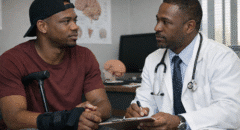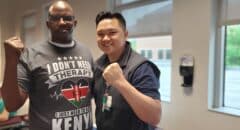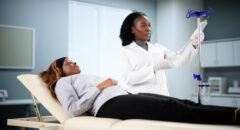
A disproportionate number of Black people suffer from strokes, which is a major public health issue. The American Stroke Association reports that Black Americans confront greater risks of stroke-related mortality and disability and that their likelihood of experiencing a first-time stroke is double that of white Americans. Keeping Black families educated about stroke symptoms and the significance of prompt intervention is vital in light of these devastating numbers. Learn the warning symptoms of a stroke and why it’s vital to get medical care right away with the aid of this helpful guide.
The F.A.S.T. Method: Your First Line of Defense
One of the most effective ways to identify a stroke is using the F.A.S.T. method. This easy-to-remember acronym stands for:
F – Face Drooping: Ask the person to smile. Is one side of the face drooping or numb?
A-Arm Weakness: Have them raise both arms. Does one arm drift downward?
S – Speech Difficulty: Ask them to repeat a simple phrase. Is their speech slurred or strange?
T – Time to Call 911: If you observe any of these signs, call for emergency medical services immediately.
You should be aware of other possible symptoms of a stroke, even if F.A.S.T. addresses the most prevalent ones:
- Sudden confusion or trouble understanding speech
- Sudden severe headache with no known cause
- Sudden trouble seeing in one or both eyes
- Sudden trouble walking, dizziness, or loss of balance
The success of treatment depends on prompt recognition of these symptoms.
RELATED: 7 Hidden Signs a Stroke May Be Looming
Why Time is Critical
Every second matters in the event of a stroke. The longer a stroke goes untreated, the more damage occurs to the brain. This highlights the critical importance of the “Time is Brain” principle in treating stroke.
There is a window of opportunity to deliver tPA, a clot-busting medication, for ischemic strokes (caused by a blood clot) between three to four and a half hours after the start of symptoms. This medicine has a higher chance of success if administered promptly. Unfortunately, many individuals, particularly those of African descent, do not reach the hospital in time for this therapy.
RELATED: 5 Stroke Risk Factors That Hit Black Folks the Hardest
Barriers to Timely Care
Black people may be less likely to seek medical attention when they experience signs of a stroke for a variety of reasons:
- Lack of awareness about stroke symptoms
- Mistrust of the healthcare system due to historical and ongoing racial disparities
- Limited access to healthcare in some communities
- Tendency to “wait and see” if symptoms improve
Education and honest dialogue within our communities and families are the first steps toward overcoming these obstacles.
Prevention is Key
Although being aware of the symptoms of a stroke is vital, taking precautions is equally important. The following are some of the risk factors for stroke that are more common among Black Americans:
- High blood pressure
- Diabetes
- Obesity
- Sickle cell disease
Managing these illnesses, getting regular checkups, and living a healthy lifestyle may greatly lower the risk of stroke.
RELATED: Cedars-Sinai Discusses the Latest Stroke Prevention Guidelines
Educate Your Family and Community
Make sure your loved ones know about this. Think about calling a family gathering to go over what to do in the event of a stroke. Here are a few important points:
- Review the F.A.S.T. method and other stroke symptoms
- Discuss any family history of stroke or related conditions
- Identify the nearest certified stroke center
- Ensure everyone knows how to call for emergency services
Stroke is a serious health problem in our community, but getting the word out and acting quickly may save lives.
Cultural Considerations
There is a long-standing practice among many Black families to try non-prescription treatments first or to wait for symptoms to improve before seeing a doctor. Certain health conditions may benefit from these methods, but they pose a significant risk of stroke when used improperly. A stroke is a life-threatening medical emergency that must be attended to by trained medical personnel without delay.
Advocating for Proper Care
Unfortunately, racial disparities exist not only in stroke occurrence but also in treatment. Studies have shown that Black stroke patients are less likely to receive certain treatments or be admitted to specialized stroke units. When accompanying a loved one to the hospital, be prepared to advocate for proper care:
- Clearly communicate the time when symptoms started
- Ask about tPA treatment if it’s within the time window
- Request a C.T. scan if it hasn’t been ordered
- Ask to be transferred to a certified stroke center if you’re not already at one
Remember, you have the right to ask questions and seek the best possible care for your loved one. Knowing how to spot stroke symptoms and taking immediate action can make a life-changing difference. By educating ourselves and our communities, we can work towards reducing the devastating impact of strokes on Black families. Stay informed, stay vigilant, and don’t hesitate to seek help when needed.









